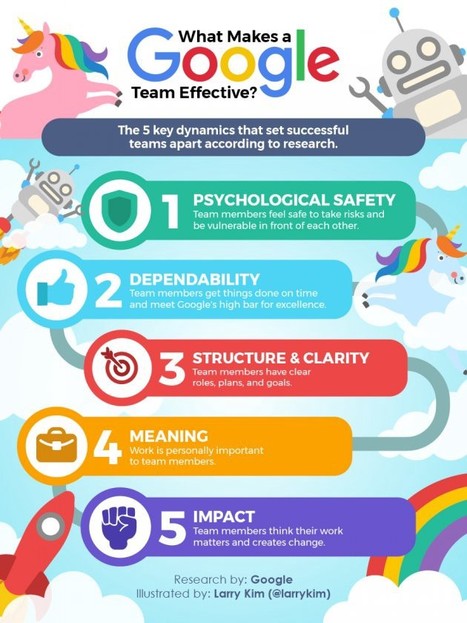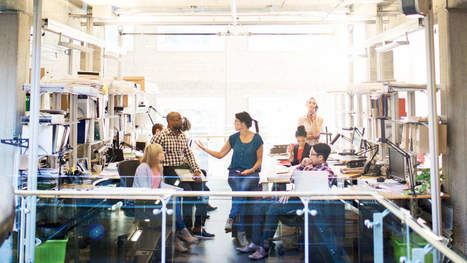 Your new post is loading...
It’s no surprise that Google, now part of Alphabet, loves data, and the company’s execs frequently share the revelations they find, such as their insights on mobile web use. But some of us would be surprised to discover that this unicorn company often turns its eye inward, analyzing information about its people to help improve its operations. A group of employees from Google’s People Operations section, the equivalent of an HR department, decided to complete an analysis to answer one question: What makes a Google team effective? Here’s a look at their approach and the startling revelations they had along the way.
Via The Learning Factor
Your brain is a comparison engine. In every new situation, it automatically rifles through your memory of every other situation you’ve encountered in the past. It swiftly finds one or a few that are similar to the current scenario, then uses that information to figure out what to do next. Most of the time, you do this without you ever realizing it. Sometimes this cognitive reflex works to your advantage, and sometimes it doesn’t. But since it’s always happening anyway, you might as well make it work for you more often than against you–at least as best you can. Here’s how.
Via The Learning Factor
We may live in a digital world, but soft skills like communication, problem solving, collaboration, and empathy are becoming more valued than technology, says Paul Roehrig, chief strategy officer for Cognizant Digital Business, a business and technology service provider. “People skills are more and more important in an era where we have powerful and pervasive technology,” he says. “It sounds counterintuitive, but to beat the bot, you need to be more human.” When evaluating their hiring plans for 2017, 62% of employers rate soft skills as very important, according to CareerBuilder. But a recent survey by the Wall Street Journal found that 89% of executives are having a difficult time finding people with these qualities.
Via The Learning Factor
I’ve been asked on a number of occasions the “secret” to harnessing mental toughness to overcome adversity. The “secret,” I tell them, isn’t a secret but a fact that they don’t want to hear because it’s simple. But simple isn’t easy. That secret is this: make a decision and go with it. That’s it. I remember waiting for Hell Week to begin in BUD/S (Basic Underwater Demolition/SEAL training) and students asking the instructors—in a somewhat uncommon cordial setting—what the secret was to making it through five and a half days of constant, nonstop activity. Here’s what the instructors said, “The secret to making it through BUD/S, is knowing you’re going to make it through BUD/S.” It’s belief. You need to believe that you’re the type of person who has the skill and will to make that goal happen, and then make it happen. Don’t worry about what’s right and don’t wait for the perfect opportunity because “perfect” doesn’t exist—it’s an excuse to procrastinate.
Via The Learning Factor
Imagine you could have a skill where--in any given conversation with colleagues, clients, or subordinates--you could be keenly aware of, and even experience, their feelings and thoughts. Sounds like some X-Men-like psychic superpower right? Well, what if I told you that anyone can have this uncanny ability and use its strength and charm to have successful conversations? Well, you can. The superpower I refer to is called empathy. But this skill--and it is a learned skill available to anyone--is often misunderstood because there are variations of it. I'll get to the science of it shortly.
Via The Learning Factor
We're already more than a week into January, but I'm still slowly working my way through all the "best of" year-end lists out there (there are so many of them!). Combing through these recommendations may be time-consuming, but it's worth the commitment, I've found, as sometimes you turn up an absolute gem you missed earlier in the year. Take the post titled "The Two Minutes It Takes to Read This Will Improve Your Writing Forever," by marketer Josh Spector, for example. As short as it is useful, the piece is one of the most recommended posts of 2016, Medium informs me. It's not hard to see why. Spector offers five dead-simple changes you can make to basically any piece of writing in a matter of seconds that will make it more forceful and compelling. We'd all enjoy reading a bit more if more writers followed his tips.
Via The Learning Factor
Training events – whether face-to-face or online are primarily focused on knowledge transfer or skill development. Learning is usually measured in terms of the % of people who have completed the training or passed the tests.
But the real learning takes place AFTER the training has ended, when the individual is back on the job applying what he or she has studied – and learning from that experience on a continual basis. Learning both from everyday personal working experiences well as interactions with their internal colleagues and/or external customers or clients. That’s how they learn most about how to do their jobs – by actually doing their jobs. Learn more: - http://www.scoop.it/t/21st-century-learning-and-teaching/?tag=Learning+by+doing
Via Gust MEES
|
Doctors use the “universal pain assessment tool” to measure how uncomfortable their patients are. It’s a simple mechanism made up of smiley (and sad) faces. At one end of the spectrum is “pain free,” and on the other is “unimaginable, unspeakable pain,” with “tolerable” and “utterly horrible” falling in between. It’s not terribly scientific, but the tool helps medical professionals download your pain data from a little chip in your brain, so to speak, making it one of the best and fastest assessments at doctors’ disposal. It’s not just pain that’s difficult to quantify–so is the human experience generally. But researchers have devised tools to study other mushy concepts, too, including creativity. And in the process we’ve learned there’s at least one thing that tends to nudge people into measurably more creative thinking: boredom.
Via The Learning Factor
1. Learn something new, even if it's stressful: Mastering a new skill means more stress now but more happiness later. If you are willing to push through a bit of added stress in the short term, you can experience huge gains in happiness for the long term. So learn a new skill. Though you'll take on a bit more stress, research shows you'll be happier on an hourly, daily, and long-term basis. The gains from this investment in time and energy were documented in a 2009 study published in the Journal of Happiness Studies. Participants who spent time on activities that increased their competency, met their need for autonomy, or helped them connect with others reported decreased happiness in the moment yet increased happiness on an hourly and daily basis. The key, according to the study, is to choose the right new skill to master, challenge to undertake, or opportunity to get out of your comfort zone. The greatest increases in happiness come from learning a skill you choose, rather than one you think you should or feel forced to learn.
Via The Learning Factor
Many of the most successful people had to fight tooth and nail for opportunities to learn new skills and advance up the corporate ladder. That’s often because what they wanted to learn and achieve wasn’t in sync with what their bosses wanted for them. You’re not a data scientist. You’re not cut out for engineering. Sales isn’t what you do. Lines like this are still used all too frequently when employees tell their managers that they want to move in a new direction. But this is only half the story. Managers are under tremendous pressure to generate results. You have annual quotas, quarterly goals, and increasing competition. Who has time to let employees go learn skills that may not be relevant for years, or may not serve your unit at all? I hear these challenges all the time as I work with managers at all levels, particularly in large corporations. I’ve also faced them myself with the companies I founded and scaled. It’s a tough balancing act. But I’ve learned key lessons to help managers turn lofty goals — such as making learning and development a central pillar of the workday — into real actions that mitigate damage to, and even help strengthen, the bottom line. Here’s how.
Via The Learning Factor
If you're looking for reasons to make time in your busy schedule to keep learning, there's no shortage of possibilities. First and foremost, perhaps, is that you'll be in great company. Bill Gates, Warren Buffett, and Oprah Winfrey all set aside dedicated time to learn new things each week. Look how far the practice has taken them. But if you're looking for more scientific explanations of why the end of school shouldn't mean the end of learning, writer John Coleman is probably your man. He writes regularly for the HBR blogs on the subject of lifelong learning and its many benefits. One of his recent posts is a must read for those who suspect they should to make more time in their lives to nourish their brains, but still need a bit of a kick in the pants.
Via The Learning Factor
You see people succeed all around you and it seems effortless for them. You feel you've stalled, or worse -- you feel like you've wasted your time doing what you're doing, and time is running out. I get it. I've been there, and I can help. So now what? Now it's time to unleash positive change in your life once and for all. Start with a question: What do you love to do? For those of you who struggled with the answer. I'm going to help you get there. Here are four steps to unleash positive change in your life immediately.
Via The Learning Factor
HR leaders are sizing up a handful of challenges that they weren't yet facing in the early days of 2016. Over the next 12 months the solutions to those obstacles will have to evolve and adapt as the overall business world does the same. Still, it's worth taking a look back at what's changed in the past year in order to see what's in store for human resources professionals in 2017. These are five of the biggest trends impacting the field right now.
Via The Learning Factor
|



 Your new post is loading...
Your new post is loading...































It’s no surprise that Google, now part of Alphabet, loves data, and the company’s execs frequently share the revelations they find, such as their insights on mobile web use. But some of us would be…
Google's Five Dynamics of team effectiveness are applicable to creating effective safety cultures as well. Dynamic 1 - psychological safety is of particular importance because so often employees fear speaking up about safety concerns.